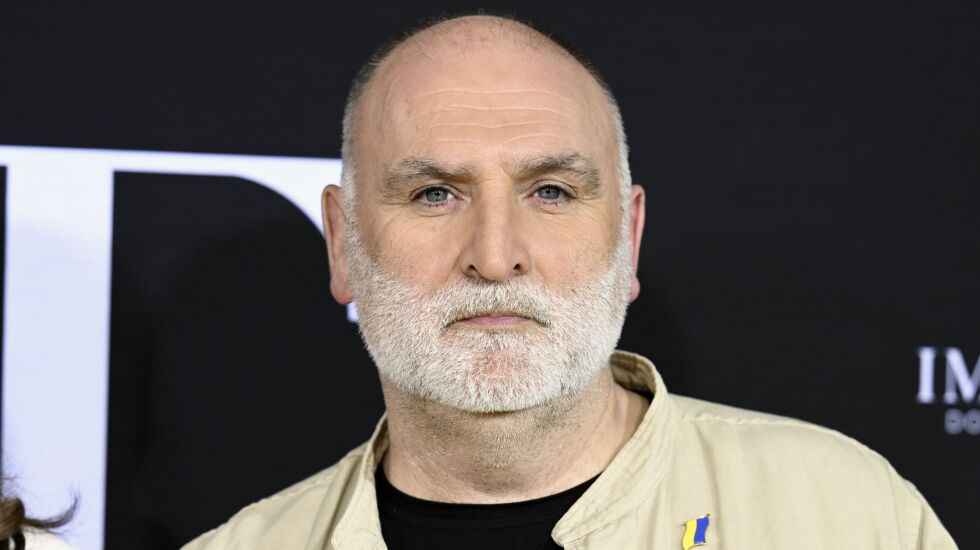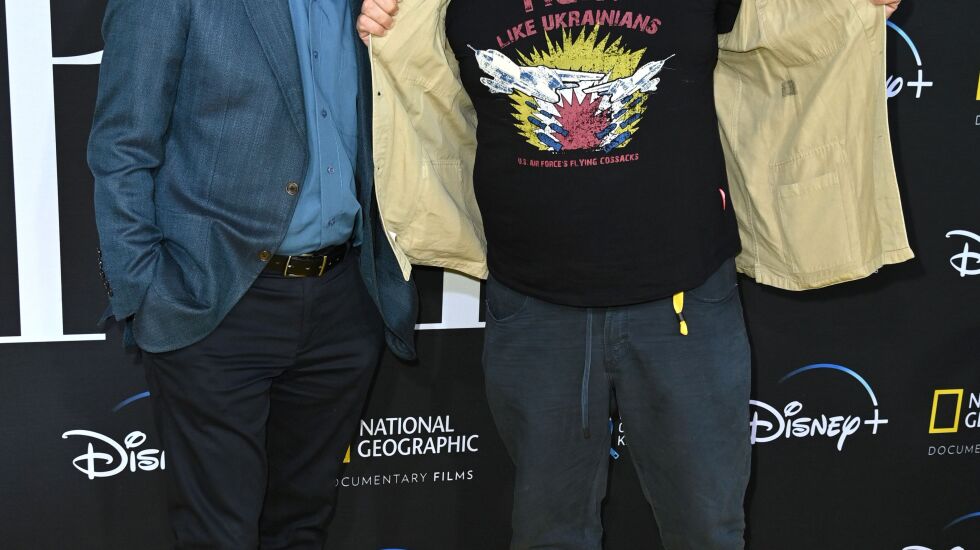
José Andrés’ voice gets deeper and his cadence slows when he talks about Ukraine.
He recalls intense military checkpoints, having to navigate unfamiliar roads without headlights to avoid giving “any information to anybody that may be a spy.” He seems far away as he describes the sirens and munitions that assaulted his senses, what he calls “the sounds of war.” When he speaks of the Ukrainian people, he’s in awe.
“You don’t feel any danger anymore because you’re surrounded by millions of people that keep going on no matter what,” he says. “These people, they don’t give up their fight.”
The Spanish-born chef traveled to Ukraine in late February after Vladimir Putin’s Russia invaded. As he always does in disaster situations, Andrés brought a network of mission-ready World Central Kitchen chefs — not to take up arms, but to put food into the hands of the people. Now, they’re making about 380,000 meals a day.

“At the end, the only good thing about it is that the best of humanity seems to always show up in the worst of humanity,” Andrés says.
Andrés has been showing up to calamitous situations with World Central Kitchen for 12 years. The scrappy humanitarian aid organization is the subject of a new documentary, “We Feed People,” directed by Oscar winner Ron Howard and premiering Friday on Disney+.
The film traces Andrés origin story, from his influence on American dining with his first restaurant, Jaleo, in Washington, D.C., in 1993 to delivering meal kits to the pandemic-devastated Navajo Nation in 2020. Through it all, viewers see Andrés is a man who refuses to accept things as they are because that’s the way they’ve always been.
“I’m very persistent at knocking on the door, and the door eventually always opens,” he says.
“We Feed People” opens in 2018 in Wilmington, North Carolina after Hurricane Florence flooded streets and displaced thousands. Amid the wreckage is Andrés, a towering figure, wearing a utility vest and baseball hat as he strategizes with a paper map dotted with color-coded sticky notes representing people who need food.
“We not only feed people, we create systems,” he says about the logistics World Central Kitchen’s aid response. “If we don’t have systems, we cannot take care of the people.”
Transporting food, organizing resources and people and distributing meals are the basis of World Central Kitchen. But what sets its methods apart are the alacrity and authenticity of how Andrés and his people interact with those in need.
After a catastrophic earthquake hit Haiti in 2010, Andrés cooked black beans for survivors. But it wasn’t the “velvety and silky black bean” stew the locals preferred. That’s when he learned that true aid – real empathy – meant learning local customs and adapting to them, not the other way around.
“He realized that you have to respect people,” says Richard Wolffe, author and managing director of Andrés’ media group, ThinkFoodGroup. “Food is about community. It’s about having food your way and not the way some white savior thinks it should be cooked. That really shaped World Central Kitchen in all of its operations moving forward.”
Through grassroots video shot by World Central Kitchen and professional documentary cameras, viewers see how the organization shows up within days, sometimes hours, of a natural disaster.
They also see the toll relief work can take. In Puerto Rico, during the botched federal response to 2017’s Hurricane Maria, Andrés reached a breaking point. He has opened loans to finance relief, mobilized the island’s food trucks to help feed thousands of people, and is doing interviews and social media posts to raise awareness of the devastation. Yet, as shown in clips, a longtime relief organization tells him there’s not enough money to go around, and during a news conference weeks after the hurricane hit, then-President Trump tosses paper towels into a crowd as if he’s playing basketball and tells them “I hate to tell you Puerto Rico, but you’ve thrown our budget a little out of whack.”
“The problem with seeing the president throwing the towels is not the towels. The problem is that’s what relief is becoming, ‘Let me throw you the bones,’ “ Andrés says.
Andrés’ wife, Patricia, whom he married in 1995, recalls how desperate he was to help and how frustrated he was he couldn’t do more. “You could see in his eyes,” she says. “He was here physically but not emotionally or even mentally.”
Puerto Rico was a watershed moment where he learned he was facing a dual battle: grow and empower World Central Kitchen while demanding better relief response from world leaders and legacy organizations.
“I’m gonna make sure I am the light in the dark room,” he says. “I cannot try to fix every problem. But water and food? We are good at food and we’re good at doing it because we’re cooks. We understand the food systems. … We maximize the response in the most difficult situations. And we always seem to be able to adapt.”







